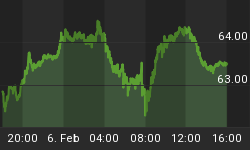Holding onto its "all is well" bias like a terrified cowboy on an enraged bull, Wall Street has managed to convince itself, and much of the world, that inflation is a non-issue. When confronted with facts to the contrary, their rationalizations come fast and thick. Nowhere is this spin more pronounced than in their dismissal of the surging price of gold as a relevant indicator.
Rather than favoring the logical conclusion that the rise in gold prices results from an inflationary expansion of money supplies around the world, Wall Street has credited its rise to other factors. The most common explanations include strong economic growth, rising jewelry demand, speculative buying, higher oil prices, the weak dollar, terrorism, uncertainly, middle east tensions, volatility, supply and demand, etc. Every possible explanation is offered save one, inflation.
Some explanations, such as a weak dollar, have some validity, but miss the point that the dollar is weak as a result of inflation (i.e. too much money creation by the Fed). In my commentary from September 30, 2005, I noted that rising gold prices were the inflationary equivalent of the canary in a coal mine. However, rather then fleeing for better air, Wall Street miners merely go about their business confident that the bird succumbed to natural causes. (Click here to read that commentary.)
Given Ben Bernanke's promise yesterday to supply substantive interest rate reductions, despite his belief that the U.S. economy is not headed toward recession (a claim that even the Fed Chairman obviously does not believe), inflation has been given much more room to run. Of course, the Fed's free money fest will not be sidetracked by today's data that showed the November trade deficit surging to $63.1 Billion (some export boom), limit-up moves in commodity prices (beans in the teens!), and 2007 import prices rising by 10.9%, the largest calendar-year increase since 1987. Basically the Fed is sending the message that inflation is going to get a whole lot worse and that it couldn't care less. As the price of gold continues to climb as a result, look for more excuses to minimize the significance of the move.
Further, as the price of gold approaches the historic $1,000 level, get ready for the pundits to proclaim the market a bubble. Of course, those same experts could not see the bubble in tech stocks in the 1990s or the larger one in real estate that followed, but they have no problem spotting a non-existent bubble in gold. The bubble crowd was particularly vocal back in April of 2006 when gold first broke $600. As a reminder, I suggest reading two commentaries I wrote at the time: one titled "Top Ten Signs of a Precious Metals Bubble," and a follow up "Would you like Ketchup with that Hat," that I wrote in response to a commentary in which the author confidently promised to eat his hat if he was not witnessing a precious metals blow-off top in the making.
It also amazes me how every time a guest on financial television suggests gold as a sound alternative investment, the host invariably points to the 1980 price of $850 to discredit the recommendation. Such was the case again this week when CNBC's Mark Haines, who three years ago told me on the air "who cares about the price of gold," pointed out that if an investor bought gold at $850 dollars per ounce in 1980 that he finally broke even. He compared "speculating" in gold to "investing" in General Electric, claiming that buying and holding the former for ten years assures investors a good return, but that buying and holding gold for a similar time period was much riskier and would likely produce losses. I don't know if Haines has noticed but GE shares are still trading at the same price they were eight years ago while the price of gold has tripled!
I agree with Mark Haines on one point. Watching gold go from $35 per ounce in 1970 to $850 in 1980, then buying at the absolute peak price and holding on though the entire bear market was pretty foolish. However, how many people actually did that? Certainly those who understood the problems the Fed created in the 1960s likely got in much earlier; say when prices were still well below $150 per ounce, and though they probably did not cash out at the peak, they likely sold above $450 sometime in the early 1980's. As a result, they protected their wealth during the inflation ravaged 1970s and were well positioned to acquire other financial assets at depressed prices.
Now, as then, gold's warning is crystal clear and obvious to anyone who honestly evaluates it. Those who heed it will be rewarded while those on Wall Street who rationalize it away will likely share the canary's fate.
For a more in depth analysis of inflation and the inherent dangers it poses for the U.S. economy and U.S. dollar denominated investments, read my new book "Crash Proof: How to Profit from the Coming Economic Collapse." Click here to order a copy today.
More importantly, don't wait for reality to set in. Protect your wealth and preserve your purchasing power before it's too late. Discover the best way to buy gold at www.goldyoucanfold.com, download my free research report on the powerful case for investing in foreign equities available at www.researchreportone.com, and subscribe to my free, on-line investment newsletter at http://www.europac.net/newsletter/newsletter.asp.















